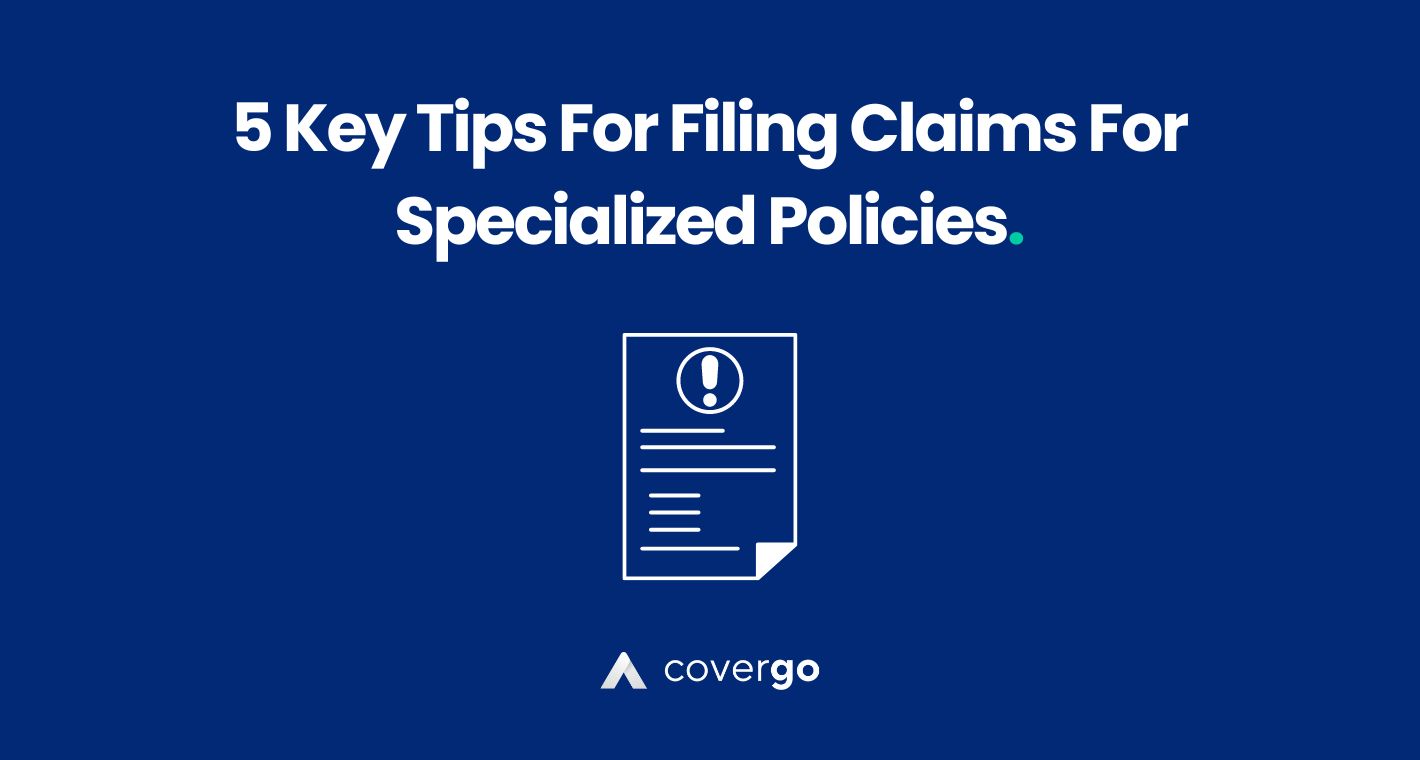Key takeaways:
- Develop a Clear Claims Strategy: Define your priorities and adapt your approach to overcome obstacles throughout the claims process.
- Know Your Policy Inside and Out: Understand coverage terms like “medically necessary” and “reasonable and customary” to effectively advocate for your claim.
- Gather Comprehensive Documentation: Prepare all necessary documents meticulously to streamline the claims submission and approval process.
- Assemble a Strong Claims Team: Collaborate with experts, including legal advisors and insurance brokers, to enhance your claim’s chances of success.
- Prepare a Detailed Claim Report: A well-prepared claim report is essential in clearly showcasing your financial losses.
Filing a claim for specialized insurance policies can be a complex and sometimes overwhelming process. However, understanding every nuance can significantly ease your experience.
Tip #1: Develop an Effective Claims Strategy
Creating a solid claims strategy is the first and most crucial step. Start by clearly defining what you want to achieve with your claim. This involves prioritizing key elements such as the recovery amount, resolution speed, and the smoothness of the process.
For example, if you are facing big financial losses, your main goal may be to recover as much as possible in the shortest time. On the other hand, if keeping a good relationship with your insurer is essential for the future, you might prioritize a smoother resolution, even if it takes more time.
Setting Priorities
To set your priorities effectively, you should consider the specifics of your situation. Ask yourself:
- How urgent is the need for funds?
- What documentation will support my claim?
- Are there any potential downsides to pursuing a larger settlement?
In addition, be prepared to change your strategy as the claims process goes on. Unexpected events can happen, such as additional damages discovered during assessments or new information about your policy coverage. Flexibility in your approach will help you respond more effectively to changes and keep focus on your objectives.
Overcoming Obstacles
You should anticipate potential obstacles that may appear during the claims process. These could include disputes over coverage, delays in documentation, or potential errors with the claims process.
By identifying possible challenges ahead of time, you can develop strategies to overcome them. For example, if you suspect that your insurer may go against certain details of your claim, you should collect additional supporting evidence early in the process to support your position.
Tip #2: Research Your Policy in Great Detail
Knowledge is power, especially when it comes to insurance claims. Getting to know the specifics of your policy is important to effectively navigate the claims process. This involves understanding not only what is covered but also the nuances of your policy.
Understanding Coverage
Take the time to read through your policy documents in great detail. Look for key sections that outline coverage limits, exclusions, and your responsibilities as a policyholder. You must also pay close attention to definitions of terms like “medically necessary” and “reasonable and customary” charges, as these can significantly impact your claim.
- Medically Necessary Coverage: This term refers to services or treatments deemed essential for diagnosing or treating a medical condition. Different insurers may have varying criteria for what makes a medical necessity, so it’s crucial to understand your insurer’s specific guidelines.
- Reasonable and Customary Charges: Insurers often limit reimbursement based on what they consider reasonable and customary for a given treatment in your area. Making yourself familiar with these charges can help you prepare for potential negotiations and ensure that you don’t accept lower payouts than what you are entitled to.
Proactive Communication
Don’t hesitate to reach out to your insurance broker or agent for clarification on any confusing terms or coverage details. They can provide you with insights and help you understand how your policy applies to your specific situation. This proactive communication can prevent later misunderstandings.
Tip #3: Prepare All Required Documents
Documentation is a critical part of any claims process. Insurers require specific documents to support your claim, and being organized can lead to a smoother experience. Start gathering the necessary documents as soon as you anticipate filing a claim.
Key Documents to Collect
Ensure you have the following documents ready:
- Claim Forms: Most insurers require a completed claim form that outlines the details of your claim. Be sure to fill it out thoroughly and accurately.
- Original Receipts: Keep all receipts related to the claim. For example, medical services or treatments you received. This includes hospital bills, treatment records, and any other expenses.
- Referral Letters: If your treatment required referrals from other healthcare providers, include these letters to demonstrate the medical necessity of the services you received.
- Diagnostic and Laboratory Reports: These documents provide evidence of the medical conditions treated and support the necessity of the treatments claimed.
- Discharge Summaries and Sick Leave Certificates: If applicable, include discharge summaries from hospitals and any documentation proving time off work due to medical issues.
Organizing Your Documentation
It is a good habit to create a dedicated folder—either physical or digital—where you can keep all relevant documents organized. Label each document clearly and keep a checklist of what you have and what may still be needed. This will not only help you during the claims process but will also make it easier to provide additional information if needed by your insurer.
Tip #4: Assemble the Right Claims Team of Experts
Don’t rely only on your insurer’s claims team. Instead, assemble a group of experts who understand your specific situation. Having a knowledgeable team can provide you with additional insights and strategies to enhance your claim’s chances of approval.
Who to Include in Your Claims Team?
- Legal Advisors: If your claim involves significant financial stakes or complex legal issues, consider consulting with a legal advisor who specializes in insurance claims. They can help you understand your rights and the nuances of the law connected to your case.
- Financial Analysts: Employing a financial analyst can provide you with detailed insights into your financial situation, helping you prepare a more convincing argument for your claim amount. These professionals can help you quantify your losses and present them properly to your insurer.
- Insurance Brokers: Your insurance broker is your main point of contact and can guide you through the entire claims process. They understand the details of your policy and can advocate on your behalf, ensuring that your claim is handled efficiently.
Collaboration and Communication
You must make sure that all members of your claims team communicate effectively. This collaboration will enhance the overall effectiveness of your strategy and ensure that no crucial details are overlooked.
Tip #5: Prepare a Detailed Claim Report
A well-prepared claim report is essential in clearly showcasing your financial losses. Ensure that your report is logical, easy to understand, and includes all relevant details. This preparation can significantly impact the approval process of your claim.
Components of a Strong Claim Report
- Breakdown of Losses: Clearly outline what you are claiming and provide a detailed breakdown. This includes medical expenses, lost wages, or any other relevant financial losses.
- Supporting Evidence: Attach copies of all supporting documentation, such as receipts and reports. This evidence will support your claims and make it easier for the insurer to process your request.
- Clear Explanations: Write clear, concise explanations of the events leading to your claim. Use straightforward language, and avoid confusing the reader. The goal is to make it easy for the claims adjuster to understand the circumstances surrounding your claim.
Presentation Matters
Consider the presentation of your claim report. Use bullet points, headers, and logical flow to make the document easy to navigate. A well-structured report not only looks professional but also speeds up understanding and processing by your insurer.
Why Is It Important to Know These Tips?
Understanding the tips in this article is vital because they equip you to handle the claims process a lot more effectively. Knowledge enhances your confidence and ensures that you are not caught off guard by your insurer’s requirements or potential challenges. On top of that, being well-prepared can lead to faster resolutions and potentially higher payouts.
What Challenges Might You Encounter?
While being informed and prepared can make the claims process a breeze, you may still face challenges such as:
- Delays in Claim Processing: Insurers may take time to process claims, leading to frustration. Understanding the typical timelines can help you set realistic expectations.
- Disputes Over Coverage: There still may be disagreements regarding what is covered under your policy. Being knowledgeable in your policy’s terms can help you effectively address these disputes.
- Insufficient Documentation: If you do not provide enough supporting documentation, your claim may be simply delayed or denied. Thorough preparation can reduce this risk.
Anticipating these challenges and having strategies to address them can help reduce stress and ensure a smoother claims experience.
Conclusion
Filing claims for specialized insurance policies doesn’t have to be overwhelming. By developing a clear strategy, understanding your policy in detail, preparing the necessary documents, assembling a capable team, and crafting a detailed claims report, you can navigate the claims process with confidence.
Remember, being proactive and informed is your best defense against the difficulties of insurance claims. With these tips in mind, you can approach the claims process with extensive knowledge of your policy, ensuring that you receive the support and compensation you deserve.
In addition, if you want to learn how to effectively and professionally manage claims, start today with CoverGo!
FAQs
Start by reviewing your insurance policy to understand your coverage and requirements. Then, develop a clear claims strategy and gather all necessary documentation to support your claim.
To speed up the claims process, prepare all required documents thoroughly, submit them promptly, and maintain clear communication with your insurer throughout the process.
Your claim report should include a detailed breakdown of your losses, supporting documents (like receipts and medical reports), and clear explanations of the events leading to your claim. This thoroughness helps ensure your claim is well-supported.
Recent posts
- How Low/No-Code Platforms are Democratizing AI for Insurers
- All of the ways AI is Transforming the Insurance M&A Industry.
- 10 Crucial Mistakes to Avoid When Filing an Insurance Claim
- 5 Important Tips That Will Make Filing Claims For Specialized Policies a Breeze
- Artificial Intelligence as The New Defender Against Insurance Fraud



